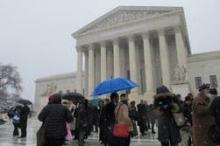WASHINGTON – The Supreme Court appears divided over whether for-profit employers can be required to provide health care coverage for contraceptives if doing so goes against their religious beliefs.
The justices heard oral arguments Mar. 25 in two cases in which employers do not want to pay for coverage of specific contraception methods, including Plan B, Ella, and two intrauterine devices. The Affordable Care Act requires that preventive care services be covered at no cost to the insured; all 20 contraceptive methods approved by the Food and Drug Administration are considered preventive care services under the law.
The employers, Hobby Lobby Stores Inc. and Conestoga Wood Specialties Corp., believe that the emergency contraceptives and IUDs are abortifacient and that being required to pay for them violates their religious beliefs and their rights under the Religious Freedom Restoration Act and the Free Exercise Clause of the First Amendment.
U.S. Solicitor General Donald B. Verrilli Jr., who represented the federal government, argued that federal and state law do not regard those contraceptives as abortifacient.
"We’ve got about 2 million women who rely on the IUD as a method of birth control in this country," he told the justices. "I don’t think they think they are engaged in abortion in doing that."
Justices Sandra Sotomayor, Ruth Bader Ginsburg, and Elena Kagan closely questioned attorney Paul Clement, who represented the companies, on whether allowing such a claim might open the door to claims that other medical treatments or procedures such as vaccinations or mental health care – or even obeying wage laws or antidiscrimination laws – also violate religious freedom.
"One religious group could opt out of this and another religious group could opt out of that and everything would be piecemeal and nothing would be uniform," Justice Kagan said. She went on to say that, if the court followed the companies’ arguments, then "the entire U.S. Code" could be subject to the same types of legal claims.
Mr. Clement, a partner with Bancroft PLLC, pointed out that the federal government has already granted exceptions to the contraceptive mandate. Religious institutions and religiously affiliated organizations can use a third-party workaround so as to not directly provide contraception coverage to their employees; further, plans that existed and have not substantially changed since the ACA’s passage are not required to cover contraceptives either.
Justice Sotomayor questioned whether it is possible for a corporation to hold and exercise religious belief and how a court would decide if a corporation was sufficiently religious to be given an exception.
Several justices questioned why Hobby Lobby or Conestoga Wood didn’t just forgo providing health insurance for their workers, but Mr. Clement said that the employers believe in providing health insurance as a benefit to their employees and are required by the ACA to do so. Each would be fined by the government for not providing insurance; fines for not providing coverage for contraception are higher.
Mr. Verrilli argued that government had a compelling interest in requiring coverage of contraception because it protects the public’s health.
Justice Antonin Scalia expressed skepticism. "You can’t argue that here because the government has made a lot of exemptions," he said.
Justice Anthony Kennedy noted that the exemptions were granted merely because a government agency – the Department of Health and Human Services – had decided to do so. It shows that "the health care coverage was not that important," when weighing whether to allow some employers to opt out, Justice Kennedy said.
But Mr. Verrilli argued that the benefits were essential. If the court allowed employers to opt out of benefits required under the ACA, it "would be extinguishing statutorily guaranteed health benefits of fundamental importance to these employees, and that is something that this court has never done," he said.
The American College of Physicians agreed. In a statement issued after the oral arguments were heard, Dr. Molly Cooke, ACP president, said that allowing employers to "selectively opt out" would undermine the ACA’s protections, "leading to under-insurance, poorer health outcomes and potentially discriminatory health benefit packages based on gender, socioeconomics, health status, religion, sexual orientation, or other factors."
Outside the court after the arguments, Mr. Clement said that the two companies were "not asking for some special treatment," but to be given the same opportunity for an exception as had been given to other companies. He would not speculate on the court’s direction, but said that "the court obviously took these cases very seriously," and that he and his clients "eagerly await the court’s decision."



